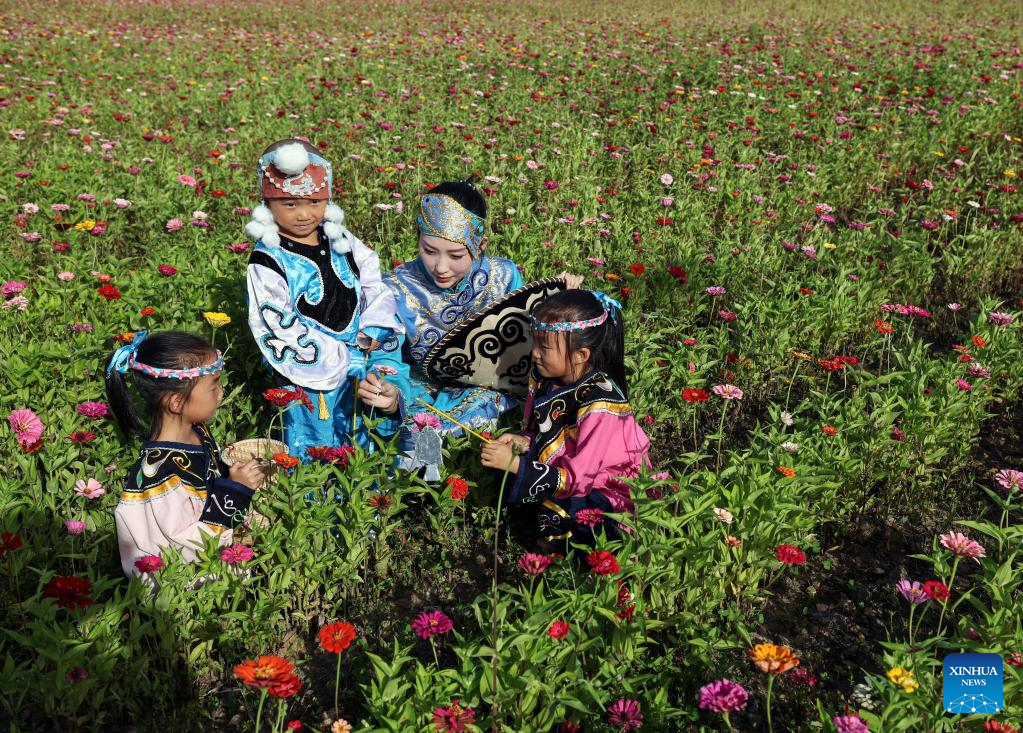
Shang Meihan spends time with local children at a flower field in the Hezhe ethnic village of Zhuaji in Wusu Town of Fuyuan City, northeast China's Heilongjiang Province, Sept. 4, 2022.
The Hezhes are one of the smallest ethnic minority groups in China. They live mainly by hunting and fishing in the plains in northeast China's Heilongjiang Province.
Shang Meihan is a young woman from the Hezhe ethnic group. While working as a public servant at the Wusu Town, the 25-year-old is also a part-time "cultural ambassador." In her spare time, she volunteers as a folk exhibition guide and a folk art performer in a Hezhe ethnic village.
Meanwhile, Shang embraces a dream of inheriting the Hezhe ethnic culture. She not only teaches Hezhe songs and dances to children, but also learns traditional fish-skin handicraft from experienced artisans.
"We Hezhe people don't have a written language so we count on non-verbal inheritance of the culture," says Shang Meihan. "My dream is to contribute as much as I can to the preservation of my own culture." (Xinhua/Lan Hongguang)
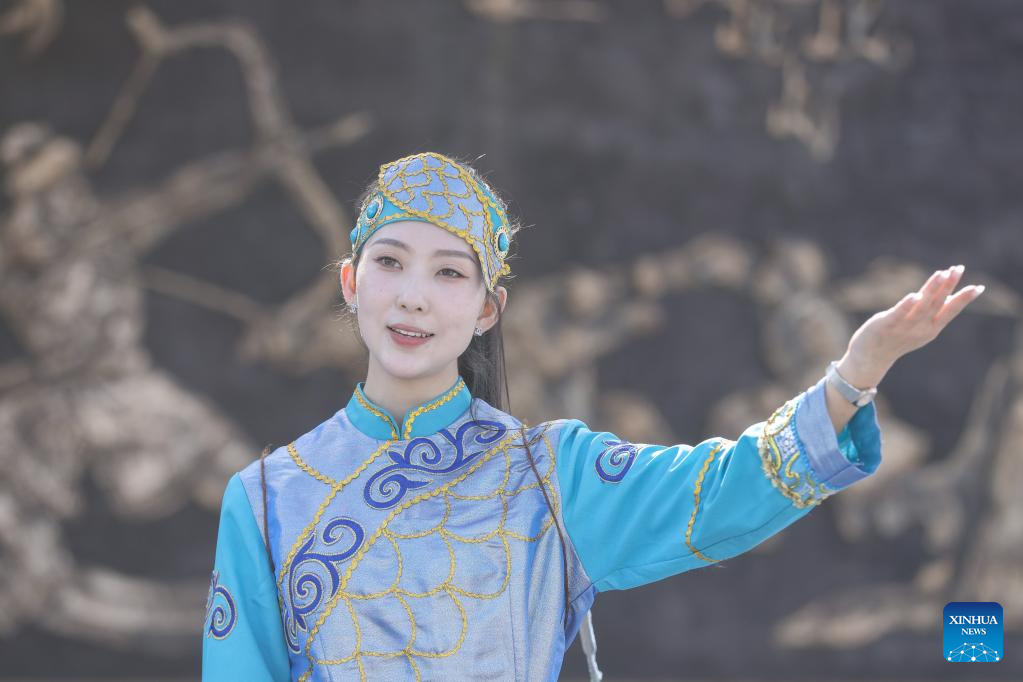
Shang Meihan sings a Hezhe song at a folk exhibition hall in the Hezhe ethnic village of Zhuaji in Wusu Town of Fuyuan City, northeast China's Heilongjiang Province, Sept. 4, 2022.
The Hezhes are one of the smallest ethnic minority groups in China. They live mainly by hunting and fishing in the plains in northeast China's Heilongjiang Province.
Shang Meihan is a young woman from the Hezhe ethnic group. While working as a public servant at the Wusu Town, the 25-year-old is also a part-time "cultural ambassador." In her spare time, she volunteers as a folk exhibition guide and a folk art performer in a Hezhe ethnic village.
Meanwhile, Shang embraces a dream of inheriting the Hezhe ethnic culture. She not only teaches Hezhe songs and dances to children, but also learns traditional fish-skin handicraft from experienced artisans.
"We Hezhe people don't have a written language so we count on non-verbal inheritance of the culture," says Shang Meihan. "My dream is to contribute as much as I can to the preservation of my own culture." (Xinhua/Zhang Tao)

Shang Meihan displays a fish-skin handicraft to children in the Hezhe ethnic village of Zhuaji in Wusu Township of Fuyuan City, northeast China's Heilongjiang Province, Sept. 7, 2022.
The Hezhes are one of the smallest ethnic minority groups in China. They live mainly by hunting and fishing in the plains in northeast China's Heilongjiang Province.
Shang Meihan is a young woman from the Hezhe ethnic group. While working as a public servant at the Wusu Town, the 25-year-old is also a part-time "cultural ambassador." In her spare time, she volunteers as a folk exhibition guide and a folk art performer in a Hezhe ethnic village.
Meanwhile, Shang embraces a dream of inheriting the Hezhe ethnic culture. She not only teaches Hezhe songs and dances to children, but also learns traditional fish-skin handicraft from experienced artisans.
"We Hezhe people don't have a written language so we count on non-verbal inheritance of the culture," says Shang Meihan. "My dream is to contribute as much as I can to the preservation of my own culture." (Xinhua/Zhang Tao)
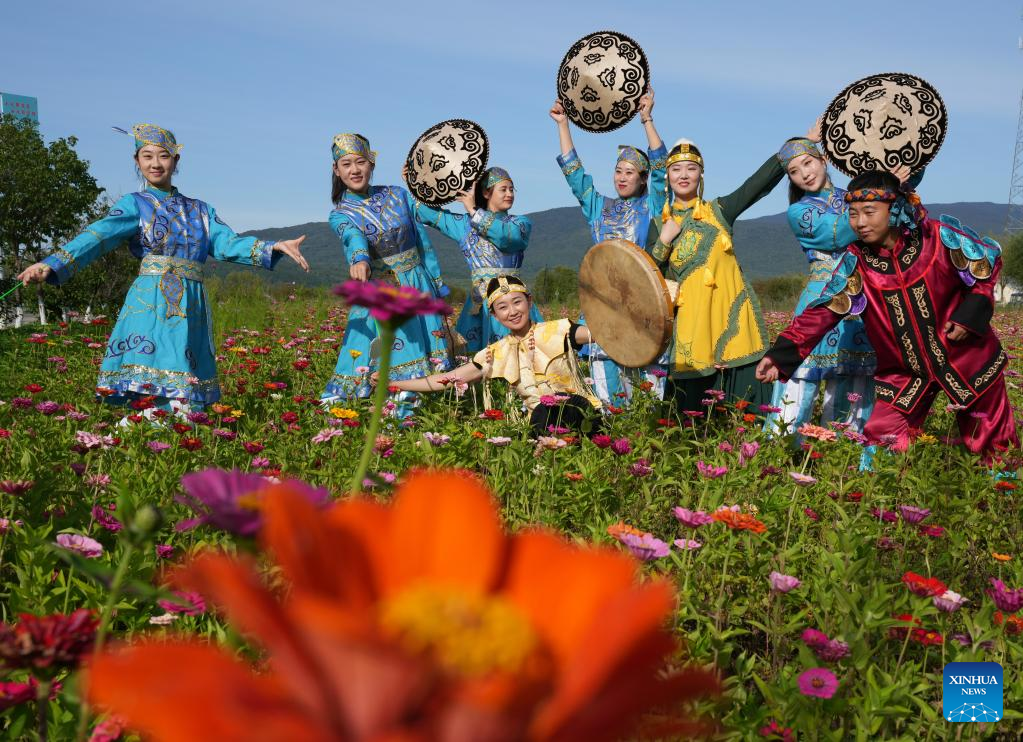
Shang Meihan (2nd R) rehearses a dance with other performers in the Hezhe ethnic village of Zhuaji in Wusu Township of Fuyuan City, northeast China's Heilongjiang Province, Sept. 4, 2022.
The Hezhes are one of the smallest ethnic minority groups in China. They live mainly by hunting and fishing in the plains in northeast China's Heilongjiang Province.
Shang Meihan is a young woman from the Hezhe ethnic group. While working as a public servant at the Wusu Town, the 25-year-old is also a part-time "cultural ambassador." In her spare time, she volunteers as a folk exhibition guide and a folk art performer in a Hezhe ethnic village.
Meanwhile, Shang embraces a dream of inheriting the Hezhe ethnic culture. She not only teaches Hezhe songs and dances to children, but also learns traditional fish-skin handicraft from experienced artisans.
"We Hezhe people don't have a written language so we count on non-verbal inheritance of the culture," says Shang Meihan. "My dream is to contribute as much as I can to the preservation of my own culture." (Xinhua/Wang Jianwei)
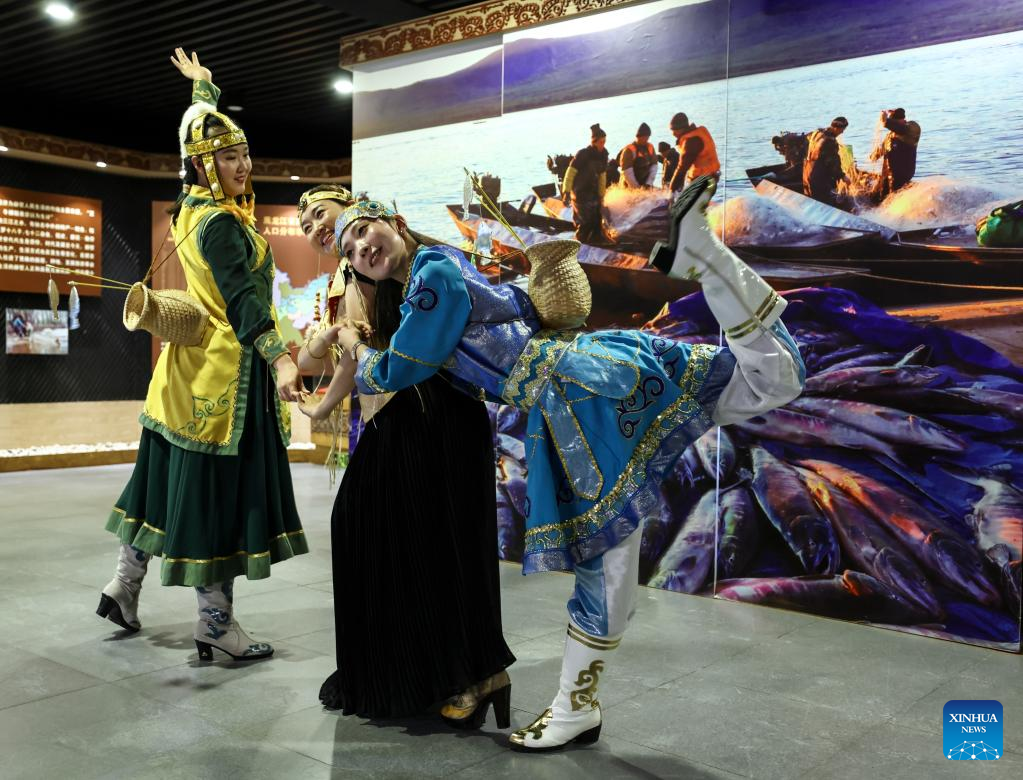
Shang Meihan (1st R) performs a dance with other performers at a folk exhibition hall in the Hezhe ethnic village of Zhuaji in Wusu Township of Fuyuan City, northeast China's Heilongjiang Province, Sept. 4, 2022.
The Hezhes are one of the smallest ethnic minority groups in China. They live mainly by hunting and fishing in the plains in northeast China's Heilongjiang Province.
Shang Meihan is a young woman from the Hezhe ethnic group. While working as a public servant at the Wusu Town, the 25-year-old is also a part-time "cultural ambassador." In her spare time, she volunteers as a folk exhibition guide and a folk art performer in a Hezhe ethnic village.
Meanwhile, Shang embraces a dream of inheriting the Hezhe ethnic culture. She not only teaches Hezhe songs and dances to children, but also learns traditional fish-skin handicraft from experienced artisans.
"We Hezhe people don't have a written language so we count on non-verbal inheritance of the culture," says Shang Meihan. "My dream is to contribute as much as I can to the preservation of my own culture." (Xinhua/Lan Hongguang)
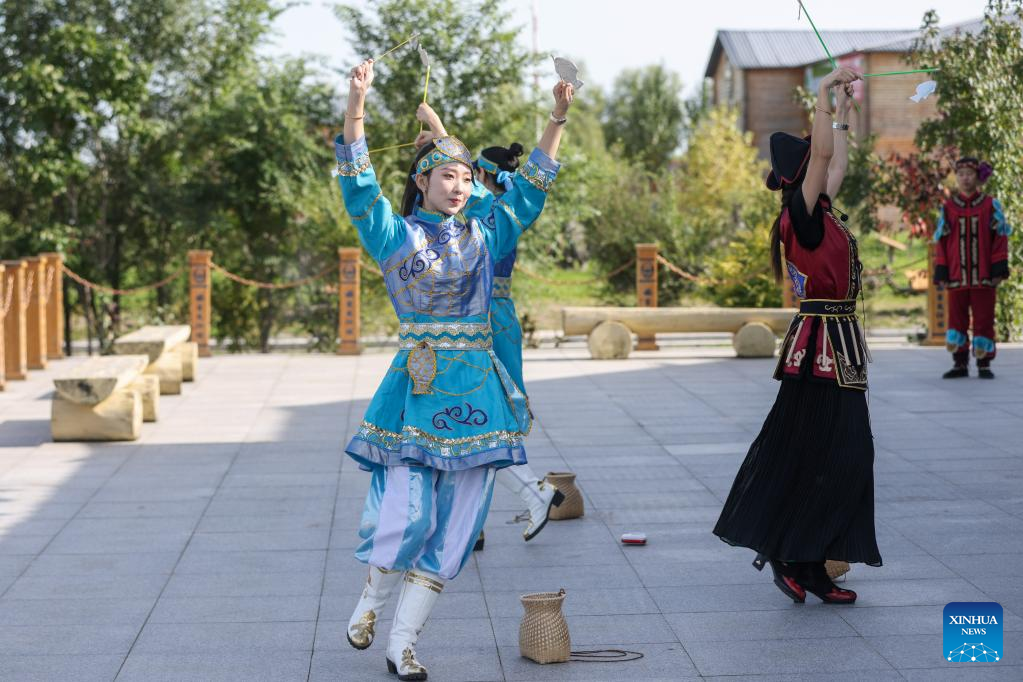
Shang Meihan (1st L) performs a Hezhe dance at a folk exhibition hall in the Hezhe ethnic village of Zhuaji in Wusu Town of Fuyuan City, northeast China's Heilongjiang Province, Sept. 4, 2022.
The Hezhes are one of the smallest ethnic minority groups in China. They live mainly by hunting and fishing in the plains in northeast China's Heilongjiang Province.
Shang Meihan is a young woman from the Hezhe ethnic group. While working as a public servant at the Wusu Town, the 25-year-old is also a part-time "cultural ambassador." In her spare time, she volunteers as a folk exhibition guide and a folk art performer in a Hezhe ethnic village.
Meanwhile, Shang embraces a dream of inheriting the Hezhe ethnic culture. She not only teaches Hezhe songs and dances to children, but also learns traditional fish-skin handicraft from experienced artisans.
"We Hezhe people don't have a written language so we count on non-verbal inheritance of the culture," says Shang Meihan. "My dream is to contribute as much as I can to the preservation of my own culture." (Xinhua/Zhang Tao)
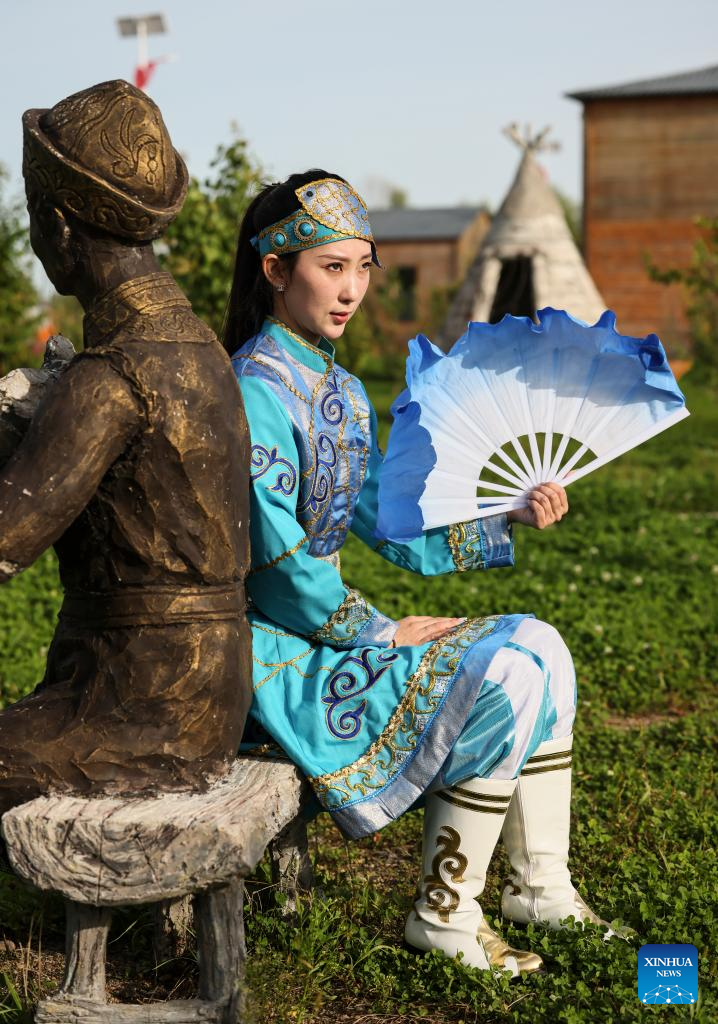
Shang Meihan, dressed in folk costume, poses for photos in the Hezhe ethnic village of Zhuaji in Wusu Township of Fuyuan City, northeast China's Heilongjiang Province, Sept. 4, 2022.
The Hezhes are one of the smallest ethnic minority groups in China. They live mainly by hunting and fishing in the plains in northeast China's Heilongjiang Province.
Shang Meihan is a young woman from the Hezhe ethnic group. While working as a public servant at the Wusu Town, the 25-year-old is also a part-time "cultural ambassador." In her spare time, she volunteers as a folk exhibition guide and a folk art performer in a Hezhe ethnic village.
Meanwhile, Shang embraces a dream of inheriting the Hezhe ethnic culture. She not only teaches Hezhe songs and dances to children, but also learns traditional fish-skin handicraft from experienced artisans.
"We Hezhe people don't have a written language so we count on non-verbal inheritance of the culture," says Shang Meihan. "My dream is to contribute as much as I can to the preservation of my own culture." (Xinhua/Lan Hongguang)
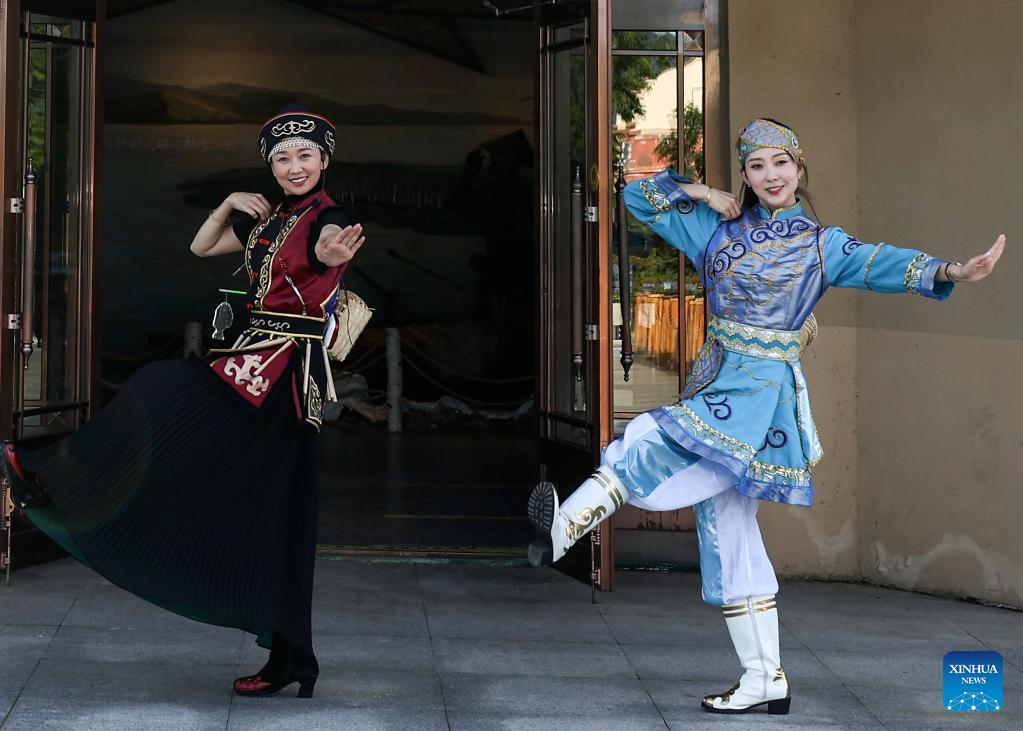
Shang Meihan (R) performs a Hezhe dance at a folk exhibition hall in the Hezhe ethnic village of Zhuaji in Wusu Town of Fuyuan City, northeast China's Heilongjiang Province, Sept. 4, 2022.
The Hezhes are one of the smallest ethnic minority groups in China. They live mainly by hunting and fishing in the plains in northeast China's Heilongjiang Province.
Shang Meihan is a young woman from the Hezhe ethnic group. While working as a public servant at the Wusu Town, the 25-year-old is also a part-time "cultural ambassador." In her spare time, she volunteers as a folk exhibition guide and a folk art performer in a Hezhe ethnic village.
Meanwhile, Shang embraces a dream of inheriting the Hezhe ethnic culture. She not only teaches Hezhe songs and dances to children, but also learns traditional fish-skin handicraft from experienced artisans.
"We Hezhe people don't have a written language so we count on non-verbal inheritance of the culture," says Shang Meihan. "My dream is to contribute as much as I can to the preservation of my own culture." (Xinhua/Lan Hongguang)
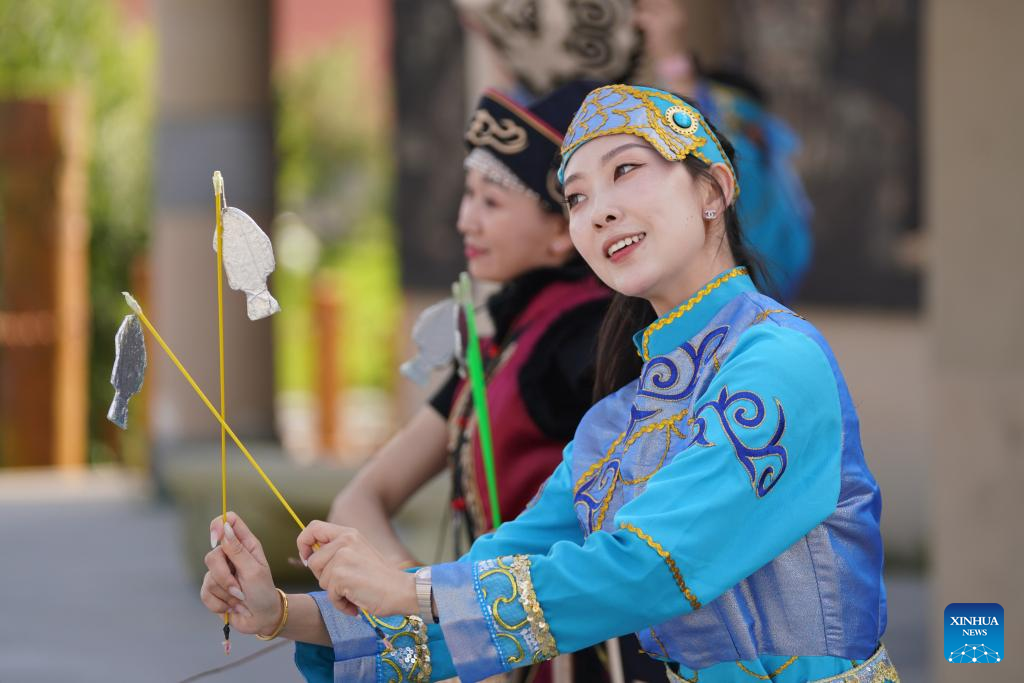
Shang Meihan (1st L) performs a Hezhe dance in the Hezhe ethnic village of Zhuaji in Wusu Town of Fuyuan City, northeast China's Heilongjiang Province, Sept. 4, 2022.
The Hezhes are one of the smallest ethnic minority groups in China. They live mainly by hunting and fishing in the plains in northeast China's Heilongjiang Province.
Shang Meihan is a young woman from the Hezhe ethnic group. While working as a public servant at the Wusu Town, the 25-year-old is also a part-time "cultural ambassador." In her spare time, she volunteers as a folk exhibition guide and a folk art performer in a Hezhe ethnic village.
Meanwhile, Shang embraces a dream of inheriting the Hezhe ethnic culture. She not only teaches Hezhe songs and dances to children, but also learns traditional fish-skin handicraft from experienced artisans.
"We Hezhe people don't have a written language so we count on non-verbal inheritance of the culture," says Shang Meihan. "My dream is to contribute as much as I can to the preservation of my own culture." (Xinhua/Wang Jianwei)
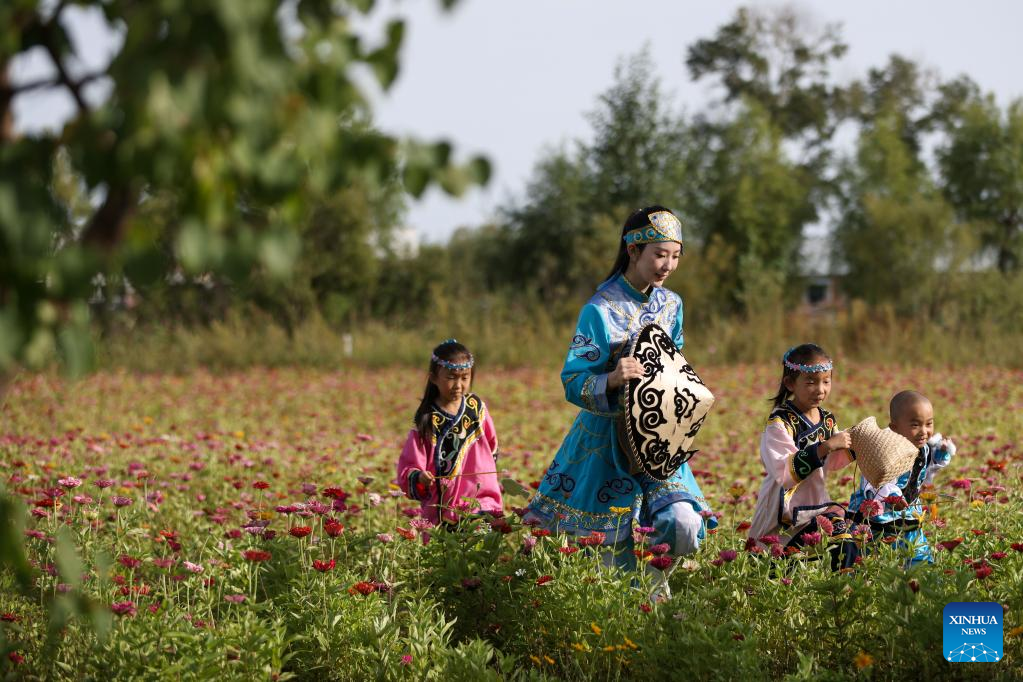
Shang Meihan (2nd L) spends time with local children at a flower field in the Hezhe ethnic village of Zhuaji in Wusu Town of Fuyuan City, northeast China's Heilongjiang Province, Sept. 4, 2022.
The Hezhes are one of the smallest ethnic minority groups in China. They live mainly by hunting and fishing in the plains in northeast China's Heilongjiang Province.
Shang Meihan is a young woman from the Hezhe ethnic group. While working as a public servant at the Wusu Town, the 25-year-old is also a part-time "cultural ambassador." In her spare time, she volunteers as a folk exhibition guide and a folk art performer in a Hezhe ethnic village.
Meanwhile, Shang embraces a dream of inheriting the Hezhe ethnic culture. She not only teaches Hezhe songs and dances to children, but also learns traditional fish-skin handicraft from experienced artisans.
"We Hezhe people don't have a written language so we count on non-verbal inheritance of the culture," says Shang Meihan. "My dream is to contribute as much as I can to the preservation of my own culture." (Xinhua/Zhang Tao)
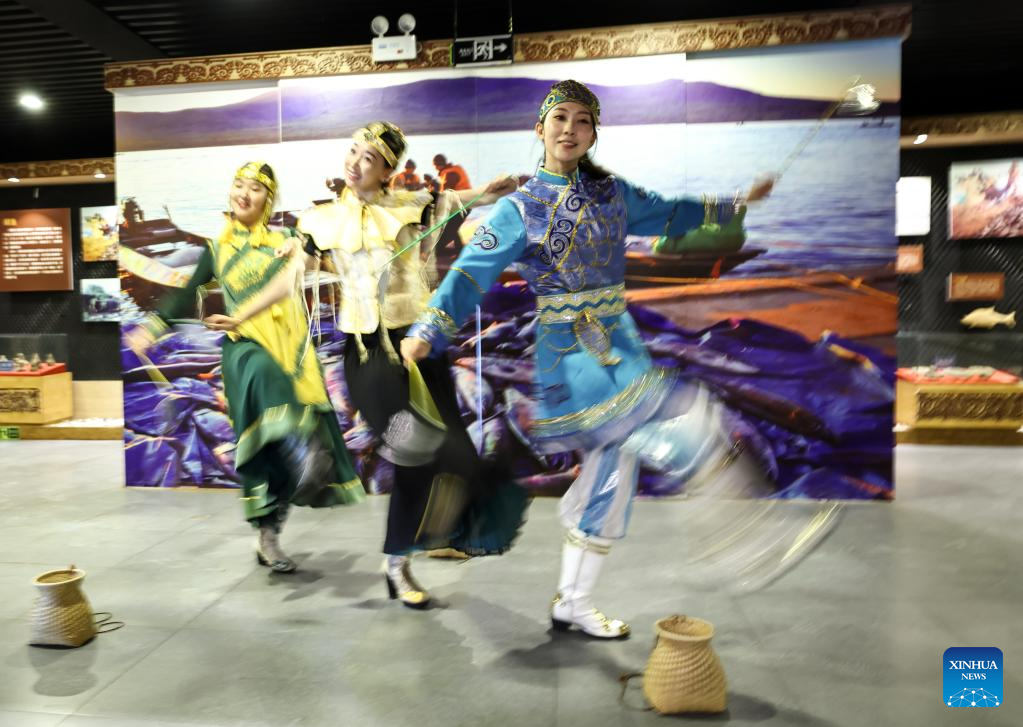
Shang Meihan (1st R) performs a dance with other performers at a folk exhibition hall in the Hezhe ethnic village of Zhuaji in Wusu Township of Fuyuan City, northeast China's Heilongjiang Province, Sept. 4, 2022.
The Hezhes are one of the smallest ethnic minority groups in China. They live mainly by hunting and fishing in the plains in northeast China's Heilongjiang Province.
Shang Meihan is a young woman from the Hezhe ethnic group. While working as a public servant at the Wusu Town, the 25-year-old is also a part-time "cultural ambassador." In her spare time, she volunteers as a folk exhibition guide and a folk art performer in a Hezhe ethnic village.
Meanwhile, Shang embraces a dream of inheriting the Hezhe ethnic culture. She not only teaches Hezhe songs and dances to children, but also learns traditional fish-skin handicraft from experienced artisans.
"We Hezhe people don't have a written language so we count on non-verbal inheritance of the culture," says Shang Meihan. "My dream is to contribute as much as I can to the preservation of my own culture." (Xinhua/Lan Hongguang)
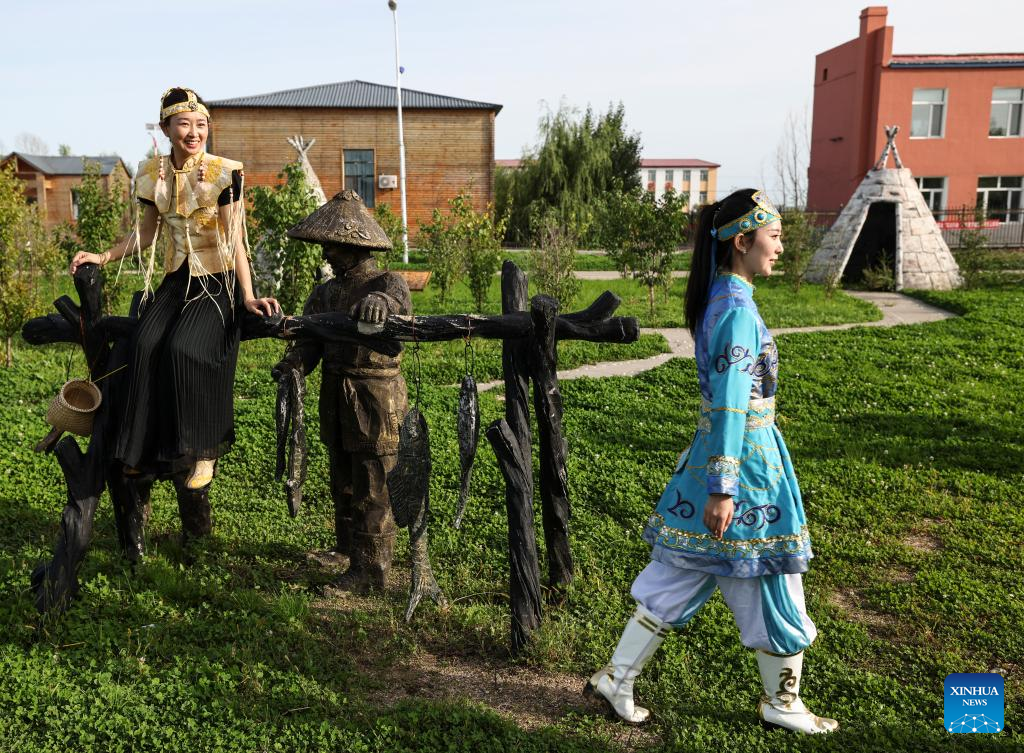
Shang Meihan (R) takes a rest during a rehearsal in the Hezhe ethnic village of Zhuaji in Wusu Township of Fuyuan City, northeast China's Heilongjiang Province, Sept. 4, 2022.
The Hezhes are one of the smallest ethnic minority groups in China. They live mainly by hunting and fishing in the plains in northeast China's Heilongjiang Province.
Shang Meihan is a young woman from the Hezhe ethnic group. While working as a public servant at the Wusu Town, the 25-year-old is also a part-time "cultural ambassador." In her spare time, she volunteers as a folk exhibition guide and a folk art performer in a Hezhe ethnic village.
Meanwhile, Shang embraces a dream of inheriting the Hezhe ethnic culture. She not only teaches Hezhe songs and dances to children, but also learns traditional fish-skin handicraft from experienced artisans.
"We Hezhe people don't have a written language so we count on non-verbal inheritance of the culture," says Shang Meihan. "My dream is to contribute as much as I can to the preservation of my own culture." (Xinhua/Lan Hongguang)
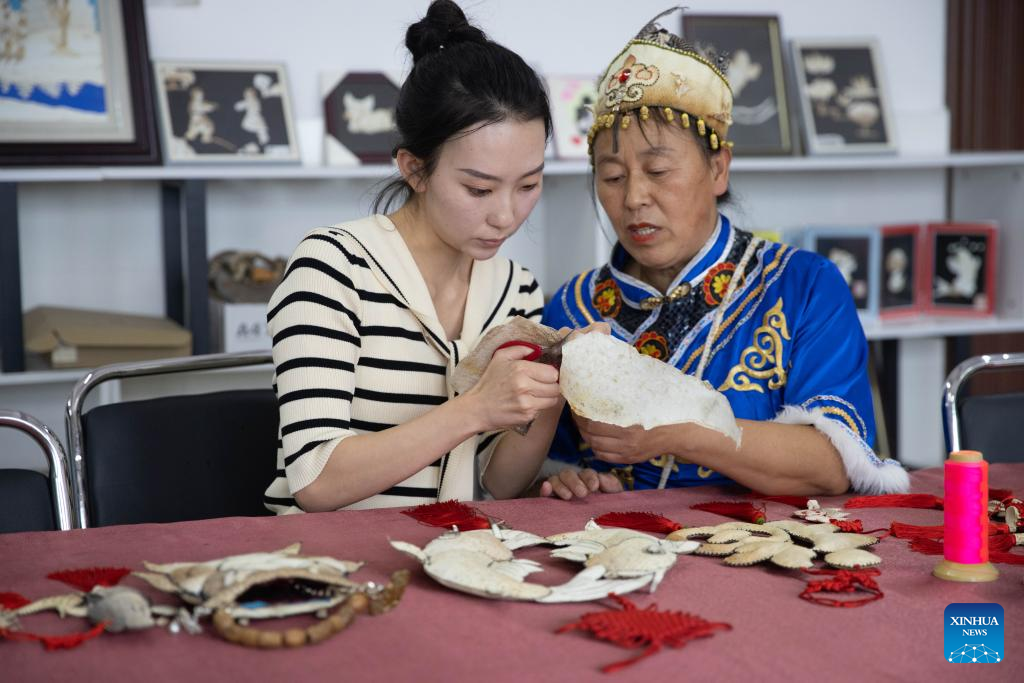
Shang Meihan (L) learns to make a traditional fish-skin handicraft from an experienced artisan in the Hezhe ethnic village of Zhuaji in Wusu Town of Fuyuan City, northeast China's Heilongjiang Province, Sept. 7, 2022.
The Hezhes are one of the smallest ethnic minority groups in China. They live mainly by hunting and fishing in the plains in northeast China's Heilongjiang Province.
Shang Meihan is a young woman from the Hezhe ethnic group. While working as a public servant at the Wusu Town, the 25-year-old is also a part-time "cultural ambassador." In her spare time, she volunteers as a folk exhibition guide and a folk art performer in a Hezhe ethnic village.
Meanwhile, Shang embraces a dream of inheriting the Hezhe ethnic culture. She not only teaches Hezhe songs and dances to children, but also learns traditional fish-skin handicraft from experienced artisans.
"We Hezhe people don't have a written language so we count on non-verbal inheritance of the culture," says Shang Meihan. "My dream is to contribute as much as I can to the preservation of my own culture." (Xinhua/Zhang Tao)
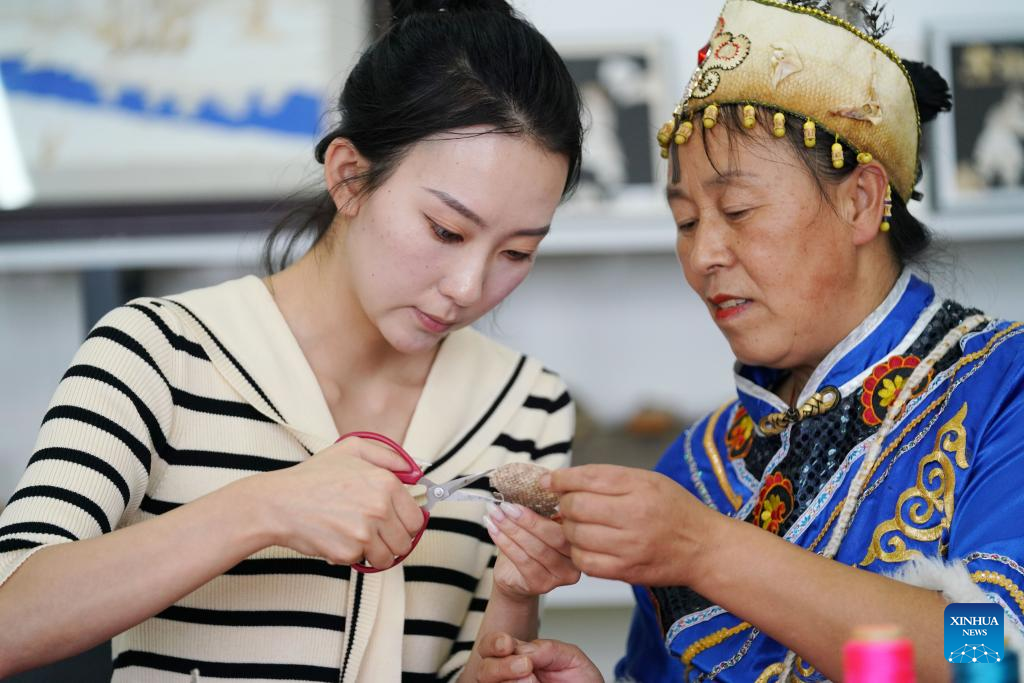
Shang Meihan (L) makes a handicraft together with an experienced artisan in Fuyuan City, northeast China's Heilongjiang Province, Sept. 7, 2022.
The Hezhes are one of the smallest ethnic minority groups in China. They live mainly by hunting and fishing in the plains in northeast China's Heilongjiang Province.
Shang Meihan is a young woman from the Hezhe ethnic group. While working as a public servant at the Wusu Town, the 25-year-old is also a part-time "cultural ambassador." In her spare time, she volunteers as a folk exhibition guide and a folk art performer in a Hezhe ethnic village.
Meanwhile, Shang embraces a dream of inheriting the Hezhe ethnic culture. She not only teaches Hezhe songs and dances to children, but also learns traditional fish-skin handicraft from experienced artisans.
"We Hezhe people don't have a written language so we count on non-verbal inheritance of the culture," says Shang Meihan. "My dream is to contribute as much as I can to the preservation of my own culture." (Xinhua/Wang Jianwei)
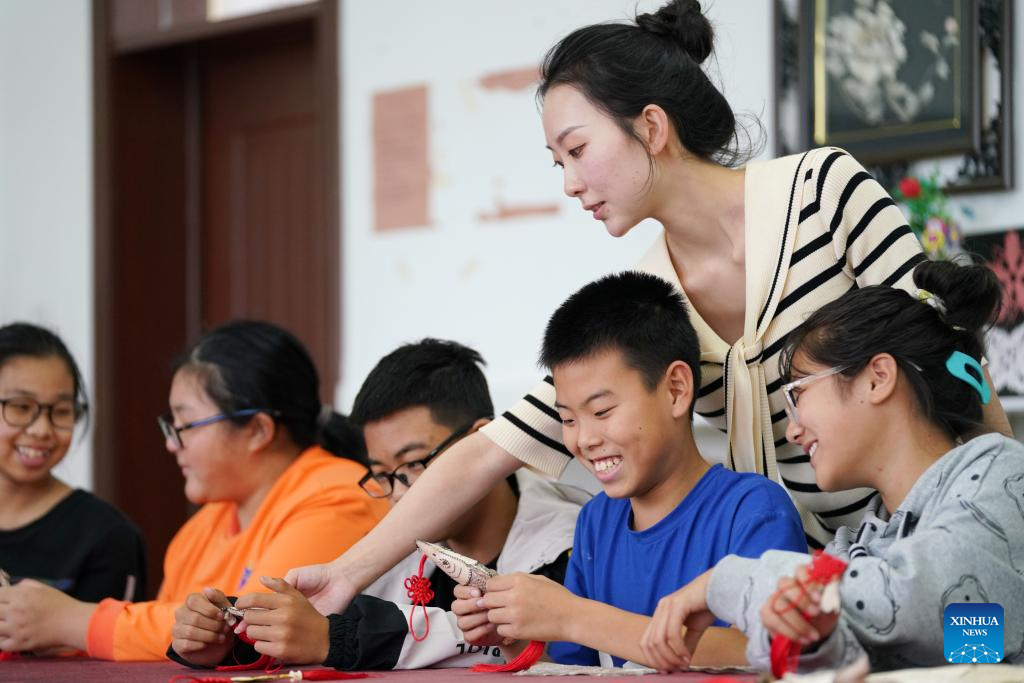
Shang Meihan instructs children to make handicrafts in the Hezhe ethnic village of Zhuaji in Wusu Township of Fuyuan City, northeast China's Heilongjiang Province, Sept. 7, 2022.
The Hezhes are one of the smallest ethnic minority groups in China. They live mainly by hunting and fishing in the plains in northeast China's Heilongjiang Province.
Shang Meihan is a young woman from the Hezhe ethnic group. While working as a public servant at the Wusu Town, the 25-year-old is also a part-time "cultural ambassador." In her spare time, she volunteers as a folk exhibition guide and a folk art performer in a Hezhe ethnic village.
Meanwhile, Shang embraces a dream of inheriting the Hezhe ethnic culture. She not only teaches Hezhe songs and dances to children, but also learns traditional fish-skin handicraft from experienced artisans.
"We Hezhe people don't have a written language so we count on non-verbal inheritance of the culture," says Shang Meihan. "My dream is to contribute as much as I can to the preservation of my own culture." (Xinhua/Wang Jianwei)

Shang Meihan (R) does figure exercises at a folk exhibition hall in the Hezhe ethnic village of Zhuaji in Wusu Township of Fuyuan City, northeast China's Heilongjiang Province, Sept. 4, 2022.
The Hezhes are one of the smallest ethnic minority groups in China. They live mainly by hunting and fishing in the plains in northeast China's Heilongjiang Province.
Shang Meihan is a young woman from the Hezhe ethnic group. While working as a public servant at the Wusu Town, the 25-year-old is also a part-time "cultural ambassador." In her spare time, she volunteers as a folk exhibition guide and a folk art performer in a Hezhe ethnic village.
Meanwhile, Shang embraces a dream of inheriting the Hezhe ethnic culture. She not only teaches Hezhe songs and dances to children, but also learns traditional fish-skin handicraft from experienced artisans.
"We Hezhe people don't have a written language so we count on non-verbal inheritance of the culture," says Shang Meihan. "My dream is to contribute as much as I can to the preservation of my own culture." (Xinhua/Lan Hongguang)
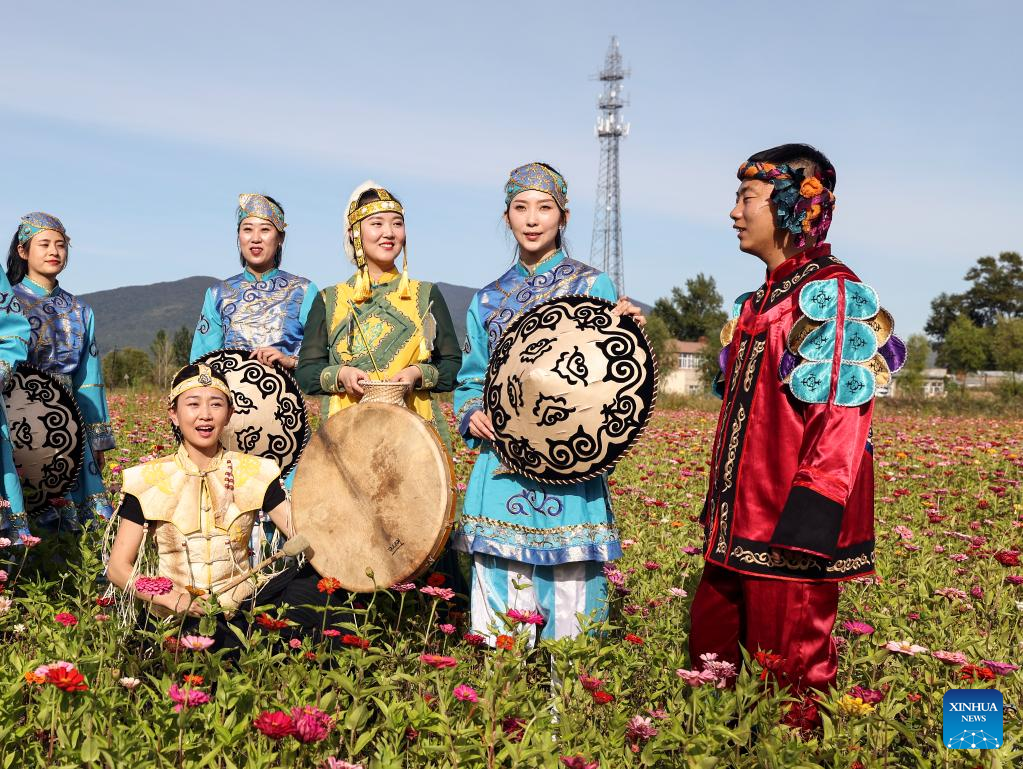
Shang Meihan (2nd R) rehearses a dance with other performers in the Hezhe ethnic village of Zhuaji in Wusu Township of Fuyuan City, northeast China's Heilongjiang Province, Sept. 4, 2022.
The Hezhes are one of the smallest ethnic minority groups in China. They live mainly by hunting and fishing in the plains in northeast China's Heilongjiang Province.
Shang Meihan is a young woman from the Hezhe ethnic group. While working as a public servant at the Wusu Town, the 25-year-old is also a part-time "cultural ambassador." In her spare time, she volunteers as a folk exhibition guide and a folk art performer in a Hezhe ethnic village.
Meanwhile, Shang embraces a dream of inheriting the Hezhe ethnic culture. She not only teaches Hezhe songs and dances to children, but also learns traditional fish-skin handicraft from experienced artisans.
"We Hezhe people don't have a written language so we count on non-verbal inheritance of the culture," says Shang Meihan. "My dream is to contribute as much as I can to the preservation of my own culture." (Xinhua/Lan Hongguang)
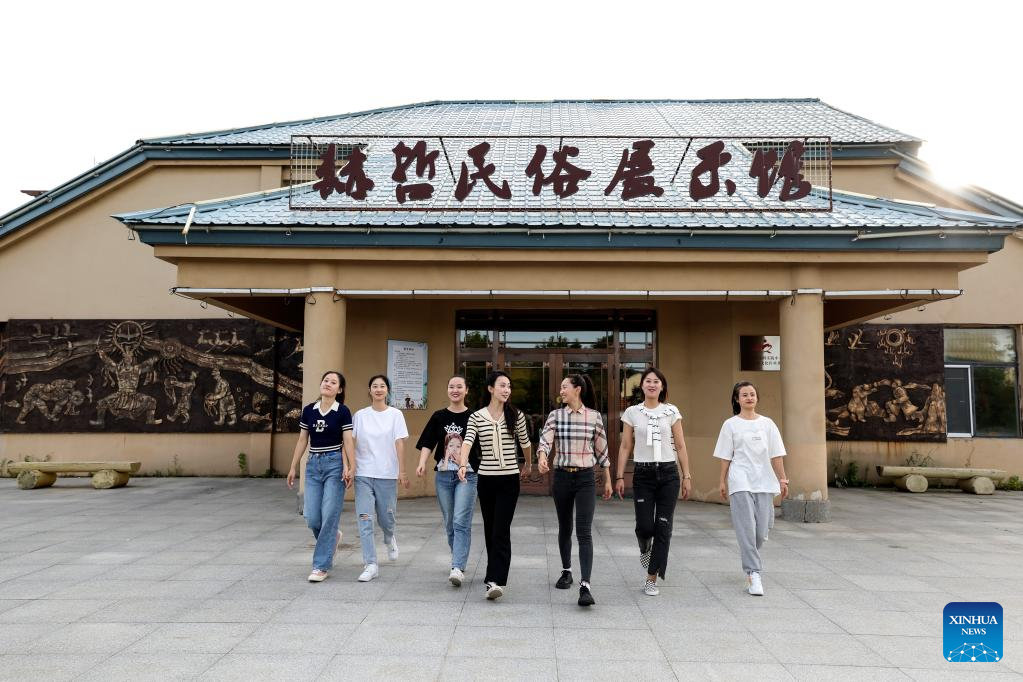
Shang Meihan (4th L) does figure exercises with other performers at a folk exhibition hall in the Hezhe ethnic village of Zhuaji in Wusu Township of Fuyuan City, northeast China's Heilongjiang Province, Sept. 4, 2022.
The Hezhes are one of the smallest ethnic minority groups in China. They live mainly by hunting and fishing in the plains in northeast China's Heilongjiang Province.
Shang Meihan is a young woman from the Hezhe ethnic group. While working as a public servant at the Wusu Town, the 25-year-old is also a part-time "cultural ambassador." In her spare time, she volunteers as a folk exhibition guide and a folk art performer in a Hezhe ethnic village.
Meanwhile, Shang embraces a dream of inheriting the Hezhe ethnic culture. She not only teaches Hezhe songs and dances to children, but also learns traditional fish-skin handicraft from experienced artisans.
"We Hezhe people don't have a written language so we count on non-verbal inheritance of the culture," says Shang Meihan. "My dream is to contribute as much as I can to the preservation of my own culture." (Xinhua/Lan Hongguang)



